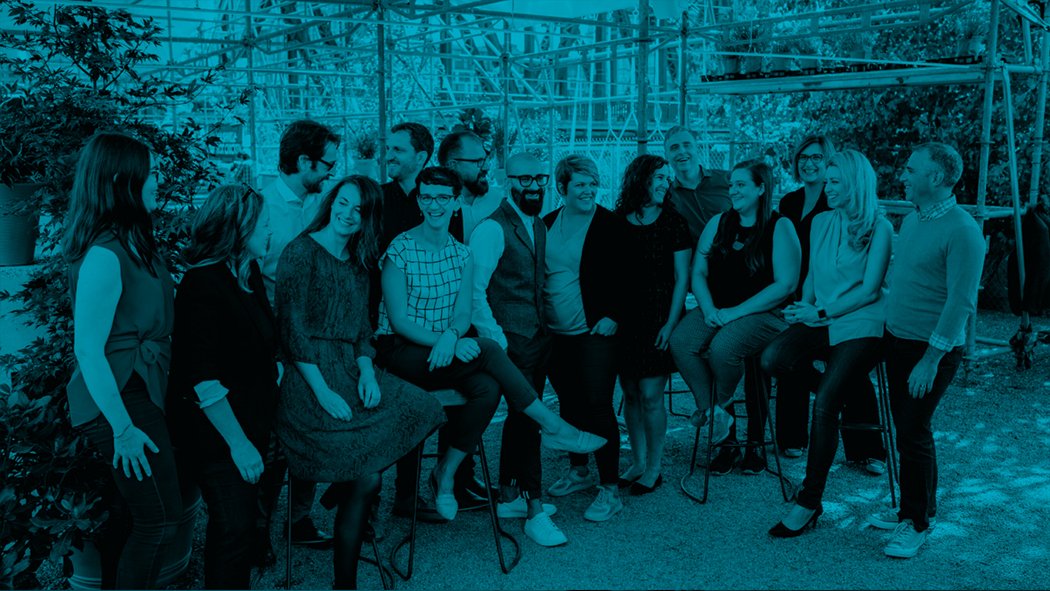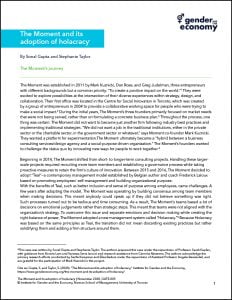Overview
The Moment was established in 2011 as a hybrid between a business consulting services/design agency and a social-purpose driven organization. This case studies how the company adopted Holacracy, a management system which disrupts the traditional hierarchical workplace. Holacracy works by clearly defining explicit roles that are not titles or designations, but sets of responsibilities that entail what decisions can and cannot be authorized by the people who hold them. This case shows how The Moment used Holacracy in order to redistribute power and change structural bias that affects women at work.
Course Topics:
- Change management
- Human resources and organizational theory
- Leadership
- Innovation
- Diversity and inclusion
- Organization Design
Introduction
The Moment was established in 2011 by Mark Kuznicki, Dan Rose, and Greg Judelman, three entrepreneurs with different backgrounds but a common priority: “To create a positive impact on the world.” They were excited to explore possibilities at the intersection of their diverse experiences within strategy, design, and collaboration. Their first office was located in the Centre for Social Innovation in Toronto, which was created by a group of entrepreneurs in 2004 to provide a collaborative working space for people who were trying to make a social impact. During the initial years, The Moment’s three founders primarily focused on market needs that were not being served, rather than on formulating a concrete business plan. Throughout the process, one thing was certain: The Moment did not want to become just another firm following industry best practices and implementing traditional strategies. “We did not want a job in the traditional institutions, either in the private sector or the charitable sector, in the government sector or whatever,” says Moment co-founder Mark Kuznicki. They wanted a platform for experimentation. The Moment ultimately became a “hybrid between a business consulting services/design agency and a social-purpose driven organization.” The Moment’s founders wanted to challenge the status quo by innovating new ways for people to work together.
Beginning in 2014, The Moment shifted from short- to longer-term consulting projects. Handling these larger-scale projects required recruiting more team members and establishing a governance process while taking proactive measures to retain the firm’s culture of innovation. Between 2015 and 2016, The Moment decided to adopt “Teal”—a contemporary management model established by Belgian author and coach Frederick Laloux based on promoting employees’ self-management and building organizational purpose.
With the benefits of Teal, such as better inclusion and sense of purpose among employees, came challenges. A few years after adopting the model, The Moment was operating by building consensus among team members when making decisions. This meant anybody could speak up if they did not believe something was right. Such processes turned out to be tedious and time consuming. As a result, The Moment’s teams based a lot of decisions on emotional judgements rather than strategic steps. This meant that teams were not aligned with the organization’s strategy. To overcome this issue and separate emotions and decision making while creating the right balance of power, The Moment adopted a new management system called “Holacracy.” Because Holacracy was based on the same principles as Teal, the transition did not mean discarding existing practices but rather solidifying them and adding a firm statute around them.
View and download the full case study
__________________________
This case was written by:
Sonal Gupta and Stephanie Taylor. The authors prepared this case under the supervision of Professor Sarah Kaplan, with guidance from Bonnie Lam and Vanessa Serra Iarocci and research assistance from Carmina Ravanera. The authors are grateful for the participation of Mark Kuznicki in this project.
Published
September 2020








